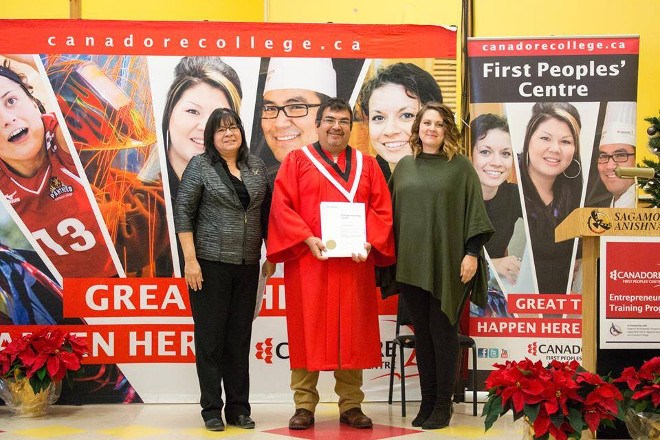Conrad Toulouse wants to stop the flow of money out of his community.
The budding entrepreneur from Sagamok Anishnawbek First Nation hopes to do this by selling groceries.
In 2010, the small northeastern Ontario community just north of Manitoulin Island conducted a study that revealed 73 per cent of community members spent their money off-reserve, especially on groceries.
To help combat those leakages and fill a local training gap, Canadore College partnered with Niigaaniin, an Ontario Works social assistance program in Sagamok, to offer its entrepreneurship training to community members.
After an intense 13 weeks, all 17 of the students graduated in December, offering a broad range of business plans, including a coffee shop, laundromat, taxi service, hairdressing salon, a multi-service law firm, and an internet provider.
Toulouse was one of those students, graduating with a $2,500 award from the college's On-Campus Entrepreneurship Activities (OCEA) program.
He worked in early childhood education and social services before deciding it was time for a change.
“It was ‘been there, done that,’” said Toulouse. “This is a new challenge for me. I enjoy being with the public. It was a good fit.”
With his business plan largely finished, Toulouse planned to visit other First Nation independently-owned and operated grocery stores to do more research in the coming months.
With some funding applications to fill out for infrastructure, marketing, and training costs, Toulouse has his location already picked out in the new industrial park going up on the reserve.
The goal is to open next fall with six employees and grow from there.
“I'm trying to start with a very conservative but achievable plan,” said Toulouse. “As we go along, if the demands and need are there, we'll expand.”
Toulouse said the program was useful for designing a business in a small community. “It was tailored to meet the needs of the participants. It's not something that was moulded or designed down in an urban area.”
“There was a lot of encouragement and motivation to achieve those small and large milestones and goals,” he added. “A number of us in the program worked together to help each other out, I had some ideas for mine, others had ideas that I didn't think of.”
Canadore instructor Charles Gagnon said the feedback has all been positive.
“The comments I get back from the students, the program has made a big difference in their lives.”
Program funding came from the community, and Gagnon said it's going to pay off.
“The outcome of the program is there are going to be new and needed businesses in Sagamok. Even if they don't start the business, they have skills now they can use down the road.” While that pathway led to Toulouse pursuing his grocery store plan, many of his fellow graduates continued in their post-secondary studies.
In 2015, Canadore ran a similar program at Wikwemikong First Nation on Manitoulin Island, with five businesses operating today.




